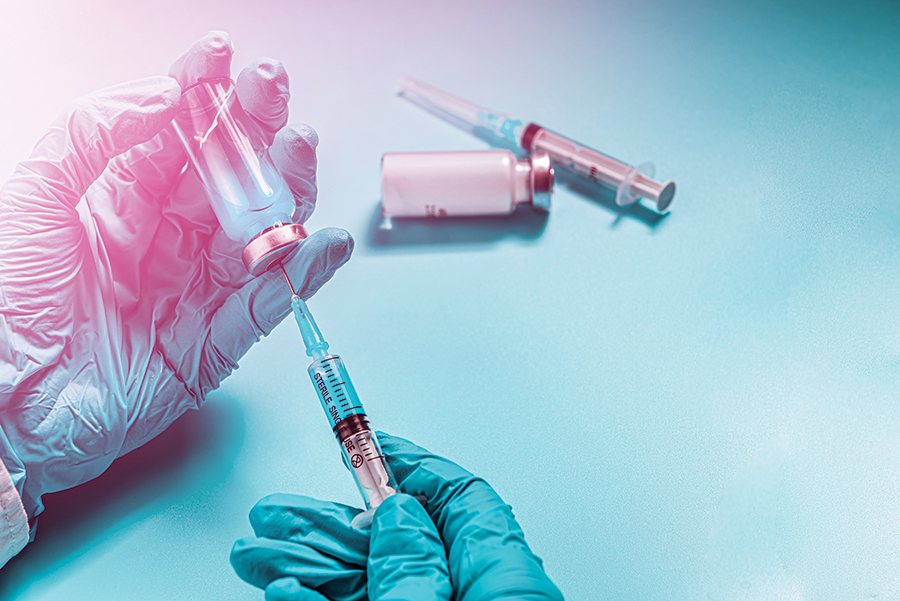The recent COVID-19 pandemic has shed light on both major vulnerabilities and key strengths of our societies. As was expected, healthcare was at the forefront—from the doctors and nurses treating patients in hospitals to the policymakers working on new policies and recommendations to protect the population, facilitate medical innovation, and strengthen the healthcare system in response to COVID-19.
Healthcare policy issues are a key priority for the American-Hellenic Chamber of Commerce, which swiftly responded with a series of roundtable and one-to-one, discussions on healthcare policy as part of its AmChamGR Digital Talks & Events Series.
In light of these high-value digital discussions—and looking ahead to AmCham’s HealthWorld 2020 conference that will be held in September 2020—Business Partners asked Thought Leaders in healthcare to share their thoughts and suggestions on the impact of the pandemic, its financial and technological implications for healthcare in Greece, and its role in accelerating the restructuring of the country’s National Healthcare System.

Building a Silver Economy Alliance
By Pascal Apostolidis, Managing Director, AbbVie
The COVID-19 pandemic revealed the strong correlation between public health and economic growth. Now, even the biggest skeptics understand that public spending on healthcare is not a cost factor but probably the most important investment for our society.
To avoid a similar crisis in the future, we must ensure that public policies for health and economy are seen as the two main aspects of a circular process, in which strong economic growth supports an effective healthcare system and such a system is a fundamental stability factor for unobstructed growth.
In a matrix like this, pharmaceutical innovation has a double contribution.
In terms of public health, new innovative therapies are fundamental for a sustainable, productive and efficient healthcare system: There can be no prevention policy without the necessary vaccines, no efficient primary healthcare system without the innovative therapies that prevent hospitalizations, and no effective hospitals without the innovative therapies that reduce surgeries, reduce the extensive use of intensive care units and shorten the duration of hospitalizations.
In terms of economic growth, pharmaceutical innovation is not only one of the best tickets to the fourth industrial revolution through clinical trial investments but also a strong prerequisite for the silver economy, a sector that could support the recovery of the Greek economy in the near future mainly through medical tourism and purchases of secondary residences by middle-aged or elderly foreign citizens. To this end, AmCham can bring together healthcare, tourism, wellness, transport, technology, construction, and agri-food companies to form a common vision and a clear roadmap on how Greece can become a leading European destination.

The New Era in the Greek Healthcare System An Opportunity for Digitization, Technology and Innovation
By Theodore Liakopoulos, President, Medical Devices & Diagnostics Committee, American-Hellenic Chamber of Commerce, Managing Director, Medical Devices Greece/Cyprus, Johnson & Johnson Commercial & Industrial SA
The pandemic has defined a new reality. It has created a unique opportunity to elevate the readiness and efficiency of healthcare systems, and it has kickstarted the process of transitioning societies to the next digital level.
The COVID-19 pandemic has brought our society many steps forward with respect to digital transformation, technology and innovation, something that would otherwise have taken a decade, maybe two, to achieve. The Greek healthcare system must use this momentum to upgrade outdated technology, stop relying on manual recordings and indexes, and minimize bureaucracy and paperwork while designing the future state on factual data rather than assumptions.
We need to use technology in areas that will improve the healthcare experience for hospitals, suppliers, healthcare professionals, and patients. Diagnosis and treatment using the new wave of digitization, platforms and applications will help hospital flows, speed up processes, and enhance communication within healthcare structures, among healthcare authorities, between healthcare professionals and patients, and between providers and hospitals.
The spectrum of implementation is endless. Examples include early diagnosis even before symptoms, optimizing treatment pathways, efficiencies in inventory management, intensive care unit optimization, operating room optimization, accident and emergency speed and readiness, reduction of patient waiting times, length of stay optimization, reduced return visits to hospitals, outpatient management, and remote health.
The medical devices and diagnostics industry has demonstrated responsiveness, standing by the healthcare system. We remain partners, connected to decisionmakers, ready for change. Together we can collaborate to advance the future of healthcare in Greece and transform healthcare for the benefit of Greek patients.

Evidence and Reason in Pharmaceutical Policy Learnings from the COVID-19 Era
By Savas Charalampidis, General Manager Greece and Cyprus, Gilead Sciences
Greece is globally hailed as one of the few countries that successfully managed the COVID-19 pandemic, despite a resource deprived healthcare system and an economy plagued by 10 years of fiscal crisis. Why? Because policymaking followed timely evidence and made room for the experts to propose what measures, when and how should be applied to safeguard the health of the population—a population that complied because it was provided with the necessary evidence.
So what would happen if such evidence guided all aspects of pharmaceutical policy? We would be able to define actual (health) needs on the basis of our—studied and published—epidemiological profile. We would be able to set priorities for our pharmaceutical budget to meet these needs. We would be able to understand what kind of innovation can change people’s lives and we would establish processes to foster and swiftly benefit from it. We would be able to make fiscal room for such innovation through targeted, evidence driven interventions on market sectors that offer critical space for savings without compromising coverage of the population. And the pharma industry would be able to collaborate with the state to introduce transparent, accountable partnerships able to measurably improve public health indicators.
Better still, we would be doing all this in the public eye, educating citizens, patients, and healthcare professionals on the need for sustainability and encouraging responsible behavior.
An undisputed winner. Driven by evidence. Delivered with transparency and accountability. We acknowledge the steps we need to take. We have the evidence. Now, we need to apply it.
Elementary, my dear Watson…

Crisis as an Opportunity to Reform the National Healthcare System
By George Papadopoulos, Head of Surgical Franchise and Country Manager Greece, Alcon Laboratories Hellas Single Member S.A.C.I.
Greece, in the midst of the COVID-19 crisis, managed to reinforce and protect the National Healthcare System from a potential overload. This crisis is an opportunity to reform, and although it is still ongoing, we should highlight two major points. Firstly, if there is willingness to drive the National Healthcare System’s resources toward a specific direction, even under the difficult conditions of urgency, all stakeholders—i.e. medical and nursing staff, healthcare companies, administration and patients—will comply and respond with speed and agility simply because it is in the common interest of all to be successful. Secondly, now is the time to move forward with implementing reforms of the National Healthcare System that should have taken place several years ago but were always passed through to the next political leadership.
The receptiveness of all stakeholders to do things differently is an opportunity arisen from this unprecedented crisis. The leadership of the National Healthcare System must seize this opportunity and address long standing problems. The safety of patients, medical staff and industry associates who are supporting all the medical technology has become a priority and should stay as such. Future decisions should take under consideration the single use of medical devices and the possibility of remote technical support. In addition, medical training should become more flexible and should include the option of using digital tools. Finally, now more than ever, procurement processes must enter the digital era, moving away from annual equipment and medical supply budgeting and toward a more sustainable budget planning that takes under consideration medium to long-term investments.

Partnerships as a Necessity
By Spyridon Gkikas Panousis, General Manager, Greece & Cyprus, GE Healthcare
The outbreak of the COVID-19 pandemic has dramatically illustrated both the contribution and the needs of the ecosystem surrounding public health. Humans, machines, structures, and services are the dominant parts of this ecosystem, and their availability or lack thereof influences the outcome of efforts to ensure the health of all of us.
The healthcare system consists of state and private structures and resources, the coexistence, cooperation, complementarity, and contribution of which have been strategically invaluable in tackling the crisis. Their role, either as main reference centers or backup and support centers, has allowed better response times, provided additional and alternative organizational options, and enhanced the self-confidence of the healthcare system.
Collaborations also provide knowhow. The collaborative approach that was chosen from the start for dealing with the crisis had a catalytic effect on correct decisionmaking and the commitment and consistency in implementation.
Technology and human resources, key pillars for healthcare, are strengthened through collaboration. Medical equipment must be modern, safe, efficient, and effective. The effectiveness and efficiency of the technology are intertwined with user familiarity and training. Meeting these needs in technology, people and education must be timely, adequate and constantly guaranteed.
Partnerships can bring new structures, services and equipment, and knowhow to the healthcare system, the capacity and potential of which have already been tested and established in several countries. This experience can help us to design collaboration schemes that will maximize the benefits for the citizens and will protect the healthcare system in Greece.

COVID-19: The Next Day for Healthcare
By Elena Chouliara, President and Managing Director, AstraZeneca Greece and Cyprus
The recent COVID-19 pandemic has stressed healthcare systems. As the impact of the COVID-19 pandemic is still being felt throughout the world, the pharmaceutical industry remains focused on the global endeavor to develop vaccines, diagnostic tests and treatments, ensure patients are well supplied with the medicines they need, and collaborate with governments and healthcare systems.
The COVID-19 outbreak highlighted that investing in pharma innovation—prevention and treatment—is critical to protect the healthcare system, improve population health, and ensure fiscal sustainability. Furthermore, it underscored the need for collaboration between all stakeholders towards continuous healthcare and pharmaceuticals provision to all Greek patients. In this context, pharma industry and the state should continue their collaboration via a three-year MoU that will (i) set a budget at a level that may address current and evolving patient needs, (ii) recognize the value that innovation brings to patient health and set the framework for prompt access, and (iii) establish efficient operation of the pharma market and control mechanisms in order to secure efficiencies.
At AstraZeneca, since the outbreak of the COVID-19 pandemic, our priority has been to ensure that we continue to supply our medicines to patients around the world while ensuring the safety and well-being of our colleagues. As the situation has evolved, we have also accelerated our R&D efforts and have engaged in multiple scientific efforts to both treat and prevent the further spread of COVID-19, including with a number of partners.

In a Post COVID-19 World, the Ability to Innovate is Key
By Gisella Dante, Managing Director Janssen Greece, Romania and Poland
Although the COVID-19 pandemic has created unprecedented disruption, it has also sparked many encouraging innovative responses. Organizations fighting infectious diseases, supporting health workers, delivering social services, and protecting livelihoods have risen to the challenge and taken center stage in the innovation spotlight. Working at a remarkable pace, experts mapped the COVID-19 genome, developed and carried out diagnostic tests, and initiated therapeutic clinical trials. Their speed and focus give us a sense of what’s possible when we nurture a mindset of innovation to find solutions to pressing healthcare needs that affect us all.
Undoubtedly, we rely on innovation in healthcare to meet the challenges posed by COVID-19, in areas such as data collection and population monitoring, testing, supply chain, and especially in therapy and vaccine development. Johnson & Johnson has embarked on a journey to develop and deliver a vaccine by early 2021 and to supply more than one billion doses of it globally on a not-for-profit basis. To achieve this, we will continue to work across businesses, academia, government, and other potential partners; the importance of interconnected collaboration has never been greater.
Dealing with a new challenge means accepting that we may need to learn from failures until we get it right. We, as a society, must put the needs and wellbeing of people first. Together, we must adopt a positive mindset, embrace change, and drive innovation. The big players in the healthcare industry, and in particular pharmaceutical companies, have an obligation to be frontrunners, pursuing medical breakthroughs, sharing expertise and collaborating across disciplines to deliver effective solutions to people who need them, creating a better and healthier world.

Budgeting Innovation Time to Rethink Pharmaceutical Expenditure
By Elizabeth Prodromou, General Manager, Bristol Myers Squibb Greece
Recent legislative changes aimed to facilitate the speedier entry of generics, biosimilars and other medicines into the List of Reimbursable Medicinal Products are a positive development and a step toward modernizing the national healthcare system. Such initiatives should be complemented with the removal of barriers to access to innovative treatments, such as the 25% entry fee, clawback (which puts unbearable pressure on all efforts to introduce new technologies in Greece), and exceeding the legislated timeline for the assessment and negotiation of new medicines.
Public pharmaceutical expenditure, and in particular hospital expenditure, remains at the same level as four years ago. It is evident that rebates from pharmaceutical companies, which especially in hospitals correspond to particularly high percentages of the manufacturer price, are now even more relevant to the industry’s request to redefine public pharmaceutical expenditure on the basis of the country’s epidemiological data and the population’s real needs while offering optimal healthcare services to Greek patients on par with other western European healthcare systems. The recent COVID-19 outbreak highlighted the need for properly assessing and boosting hospital budgets, as well as rapidly and consistently integrating new health technologies.
Fair allocation of budgets based on the aforementioned criteria will lead to an administrative reassessment of hospital budgets and ultimately to smooth patient access to treatments.
And while disease prevention expenses, such as vaccines, are of prime importance in order to improve health indicators among the population, it is equally crucial that they should be excluded from the pharmaceutical expenditure so as to free up resources to introduce innovative medicines in the country.

United We Win Present and Future of the Coronavirus Pandemic
By Agata Jakoncic, Managing Director MSD Greece, Cyprus and Malta
Greece has been recognized worldwide for successfully avoiding the worst ravages of the global pandemic. A distinctive feature of the Greek response has been trust in science experts’ opinions and leadership in action. I was astonished by how quickly the government activated the measures. It was the first time in my life that I saw emergency alerts on our phones, and I shared this great initiative with other countries as a best practice. Now Greece needs to keep this momentum of leadership excellence, support the economy, and also take into consideration what can be achieved when we are united, disciplined, and well managed. After showing the world how to successfully lock down, now Greece can take a lead in demonstrating how to reopen and prepare for the future.
As humanity anticipates the new vaccine against COVID-19, we realize the importance of protecting our health. We have realized that investing in our health means investing in society’s capabilities and in the national economy. Within this context, the contribution of pharma innovation can be significant. Investing in innovation means investing in resources, education and specialization—and this is emerging as an important part of solving the problem. Innovation supports a country’s wealth and the health of its citizens and, along with a strong healthcare system, contributes to ensuring public health and the wider development of a country.
Restricting the COVID-19 pandemic is a global health challenge, requiring co-operation in all levels, companies and sectors. As we work toward a solution, our people, our employees and their wellbeing, will be our continued focus.

The Digital Evolution of Greek Healthcare
By Ezat Azem, Managing Director, Roche Hellas
The COVID-19 crisis progressed our understanding and thinking on many aspects, one of which has the potential to reshape the future of healthcare: faster adoption of technology into the healthcare system.
The adoption of new technologies and digitalization of Greek healthcare accelerated during the COVID-19 pandemic, and patients have already experienced the benefits to their health and wellbeing. Paperless/digital prescriptions have helped patients with chronic diseases avoid unnecessary risks associated with visiting hospitals and private practices, but most importantly have shown how digital technologies can make healthcare more patient-centric.
Undoubtedly, COVID-19 has made all sides more open to the adoption of technology, demonstrating that healthcare can evolve to embrace digital technology. This openness should be leveraged further to ensure we continue moving in this direction. Blockchain technology that until recently was connected mainly to the crypto world is increasingly helping healthcare systems across the world to handle and share patient data with high standards of data privacy and protection.
The adoption of technological advancements in telemedicine will further support a more decentralized system increasing the capacity of third level hospitals and maximizing the value of primary healthcare. Digital healthcare tools can play a role in faster diagnosis, better monitoring and management of diseases, and wiser utilization of healthcare resources close to the personalized healthcare approach, meaning that every patient should be treated in a way that uniquely suits condition and disease.
Collaboration among all stakeholders is required to accelerate the effective deployment of technologies that will lead to a sustainable healthcare system through improvements in patient care delivery and efficiency, leaving a positive footprint on society.






